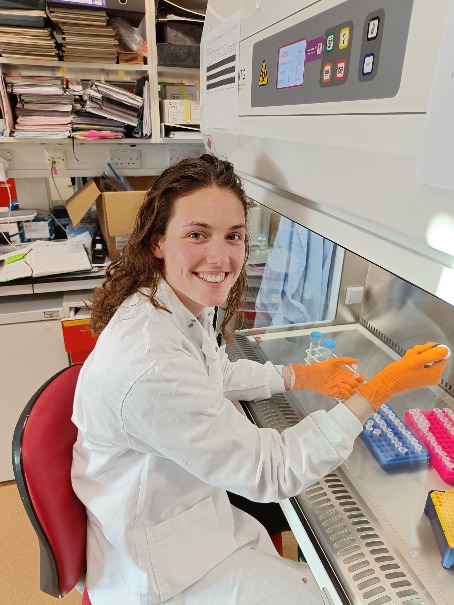Working alongside the best scientists in the world was truly inspiring and an experience I will benefit from forever

Hi! My name is Noortje and I am a recent graduate from the Molecular Medicine and Innovative Treatment (MMIT) programme. I obtained my bachelor’s degree in Biology, majoring in Biomedical Sciences, here in Groningen. Groningen is the definition of a student city and as a result, there are loads of exciting opportunities to keep you busy. During my studies, I joined several committees at different student associations and became a competitive rower.
During the MMIT programme I was able to further explore this interest in various fields of biomedical research. I decided to continue with the oncology track and used my first research project to study the molecular mechanisms underlying acute myeloid leukemia. In my second year, I wanted to know more about gene regulation - as this is often disturbed in cancer - and was able to find an internship position at the University of Oxford in a lab that studied gene regulatory mechanisms. Specifically, I studied how the spatial organization of the chromatin affects gene expression.
Your proudest achievement during MMIT?
I was most proud of getting offered an internship position at the University of Oxford. I always wanted to do an internship abroad, but I would never have thought that Oxford was one of the possibilities. Working alongside the best scientists in the world was truly inspiring and an experience I will benefit from forever. Receiving the GUF-100 prize for best student of the Faculty of Medical Sciences was icing on the cake.
MMIT prepared me for my future career mainly by letting me gain research experience
Your preferred aspect(s) of the MMIT programme?
I particularly liked the small group teaching and network that comes with it. You will have a lot of personal contact with teachers/professors so you can ask all the questions you want. Another aspect that is worth mentioning is the MMIT office, which is always willing to help with any issues that you encounter during your studies!
During course assignments you will usually receive personal guidance or feedback from (assistant) professors. I find this very valuable as you can learn a lot from interacting with professors. Like their perspectives on certain research topics, how the academic world is structured, how they think, or how they present and discuss their data. This will be very useful regardless of what kind of career you want to pursue.
How has MMIT prepared you for your career?
The MMIT programme has been instrumental for me in developing my research skills. During my first research project, I was very inexperienced and therefore often insecure about my research skills. However, in research, it is learning by doing, and therefore your learning curve is very steep. During my second research project in Oxford, I already felt much more confident and I got a lot of freedom to plan my own experiments and manage not one, but two, research projects.
MMIT prepared me for my future career mainly by letting me gain research experience. Not just by learning new lab techniques (I will probably not even use them anymore in the future) but more so by learning about science in general. Learning how to read the literature, how to critically evaluate research, how to plan a research project, how to interact with scientists and physicians, and how to write down and present your findings. These skills and experiences are fundamental for any career related to science – in academia and beyond.
Any tips for future MMIT students?
A useful strategy that has helped me throughout my entire study is networking! Don’t be afraid to email people who might be of interest to you or could help you find what you need - like an internship position. I once emailed a professor in my field of interest to ask for international contacts for an internship and she very quickly agreed to have a meeting to discuss my interests. Afterwards, she provided me with a whole list of people I could contact.
The MMIT programme is challenging but not outrageous. In general, I managed to complete all my coursework within 40 hours per week. What I very much appreciated was the fact that our deadlines were always on Fridays, so you can relax during the weekend. During the research projects (internships) you have a lot of freedom to plan your own agenda and decide how much time you want to spend on your project.
Original source: Medicine blog - Noortje Van Dijk
| Last modified: | 12 April 2024 10.21 a.m. |

